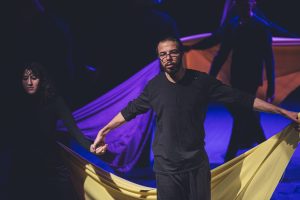Refugee Week: Shifting the Narrative
The theme of Refugee Week this year is compassion. It’s a sentiment that is at the heart of the work we do, yet is lacking in the global conversation around refugees and migration. We are working against a backdrop of hostility towards those who have been forced to flee their own countries – from the UK government attempting to pass an anti-immigration bill, to the Lebanese authorities deporting Syrian refugees and the recent Turkish election marred by anti-refugee sentiment.
At Seenaryo we believe that theatre has the power to transform communities to become more inclusive, more compassionate and more cohesive. As an art form, it holds the possibility of bringing people together from all walks of life – irrespective of age, gender, sexuality or nationality. It opens up a space for creative expression and storytelling, where people are able to speak freely and be heard.
To mark Refugee Week 2023, we have been reflecting on the transformative power of theatre by speaking to members of the Seenaryo community who have experienced forced displacement.
Hassan is an artist living in Lebanon, who has collaborated with Seenaryo on more than 20 art and theatre projects since 2017 – first as a participant, and then as a facilitator employed by Seenaryo. He said, “Displacement is very difficult. Anxiety, fear and a sense of vulnerability accompany a refugee at all times.”
Without theatre and art, I would have drowned in the vicious cycle of violence around me.
Hassan added, “I started doing art to fulfil my need to feel safe, and I now use it as a tool to express the many thoughts and feelings I have that I cannot say in words. Without theatre and art, I would have drowned in the vicious cycle of violence around me. I believe that art is essential – it makes the world a better place.”

Muhyi is also a participant with Seenaryo. He participated in a Seenaryo show in Jordan, where he sought sanctuary after fleeing Iraq at 16. He has since trained as a facilitator and has led his own theatre project with his community in Amman.
Theatre and art have breathed new life into my capacity for self-expression through movement, speech and writing.
Muhyi told us, “When I first arrived, I had difficulties communicating because of my Iraqi dialect. I felt really isolated and expressing myself freely became a challenge. Theatre and art have breathed new life into my capacity for self-expression through movement, speech and writing.”
He continued, “While art may not solve legal or health issues, it provides an outlet for expressing these challenges. Theatre also plays a crucial role in raising awareness of the refugee experience by giving the audience an understanding of refugees’ lives and the conditions they have to endure.”
